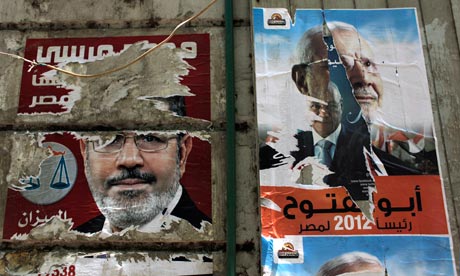The Muslim Brotherhood's presidential campaign falters in an evolving Egypt
Egyptian voters want stability but they also fear a return to the old days. The Brotherhood isn't handling this tension very well

Revolutions, as journalists and politicians tend to forget, rarely follow the scripts set for them.
They are co-opted – as Iran's revolution against the shah was by the clerics. Others, like the Ukraine's orange revolution – or Georgia's rose one, revert to a kind of business as usual, with one brand of authoritarianism and elite self-interest replaced by a new model.
It is not entirely surprising. England's period of "revolutionary" politics during the civil war and after was long drawn-out competition between parliamentary authority and the monarchy, and the French revolution was equally drawn out.
Egypt's post-revolutionary period that has followed the fall of Hosni Mubarak 14 months ago – if it is really appropriate to affix "post" to it at all – has seen a similar struggle for political ascendency between rival forces and competing ideas.
A few months ago the story, as it was across the country's of the Arab spring, was of the inevitable, unstoppable rise of the Islamist parties and what that meant. Now, as Egypt prepares for presidential elections a couple of weeks away, what is most interesting is how Egypt's most potent political organisation, the Muslim Brotherhood, the biggest winner in the parliament, appears to be struggling in the presidential campaign.
While many of the polls appear to be of limited value, in one respect they seem to reflect a reality – that the campaign of the Brotherhood's official candidate, Mohamed Morsi, is not going very well at all when compared with his former-Brotherhood rival Abdel Moneim Aboul Fotouh, and former Arab League general secretary Amr Moussa.
It is not just Morsi's lack of personal appeal, or his message in rallies that has become ever more conservative and religious as he has sought to reassure core Brotherhood voters. If the Brotherhood is in difficulty, it is because it appears unable to find a way to effectively talk to both of the contradictory themes coming out of an Egyptian society still dominated by the military in post-Mubarak era. There is, in Egypt, a desire for a return to some kind of political and economic stability that is married in large parts of the population with a profound fear that what Egypt's future holds is another brand of authoritarianism, not least through a strong and continuing military rule or influence.
Critics of the Brotherhood from all sectors of Egypt's political spectrum, from regime remnants to nationalists of Nasserite bent, to secular revolutionaries and conservative Salafists, all pick up on the same themes.
I spoke to a Salafist leader from the Al-Nour party last week, the parliamentary deputy speaker Ashraf Thabet, he was careful to set out the stall of his party, which has backed Morsi's rival Aboul Fotouh. It was clear that the Salafists seek to change society not through winning and commanding the top of power – like the Brotherhood – but by activism at the bottom of the "pyramid". This is a reflection of the suspicion that has come to cling around the Muslim Brotherhood and its Freedom and Justice party in the past six months. It is not only, its critics fear, too centralising of power and organisation, but also suspected of doing deals with the general to achieve its political aims.
While some remain suspicious of how far behind Aboul Fotouh has left his Brotherhood roots since giving up his membership last year to run for president, what is clear is that one reason that he is enjoying his present success is that he manages to share their fundamental values in an essentially conservative Muslim country while having separated himself from the Brotherhood's leadership structure.
It is possible too that the cold feet among many over the Brotherhood's official candidate reflect something more subtle and encouraging in Egyptian politics. Perhaps it is an innate reflection of a general mood in a country which has yet to draw up a constitution delineating the future checks and balances of power, that it is better to avoid allowing one party to monopolise the political institutions.
What can one conclude from all this? Simply that Egypt's revolution continues to evolve. The Muslim Brotherhood, after a catalogue of recent errors and missteps, will have to evolve as well.
SOURCE: CLICK HERE to read more
Leave a comment and / or appreciate the article!
CLICK HERE to read more:» http://www.radio-elshaday.de/
CLICK HERE to read more:» http://www.radio-megapower.de/
CLICK HERE to read more:» http://christliche-radiosender.blogspot.com/
CLICK HERE to read more:» http://radiomegapower-nonstop.blogspot.de/
Posted by: Daniel Ioan Notar *DJ_DANY*
Keine Kommentare:
Kommentar veröffentlichen